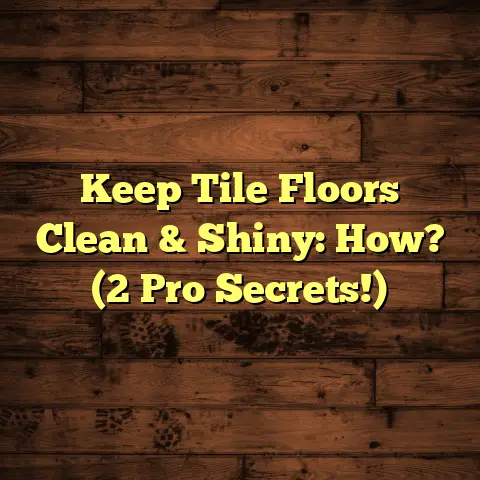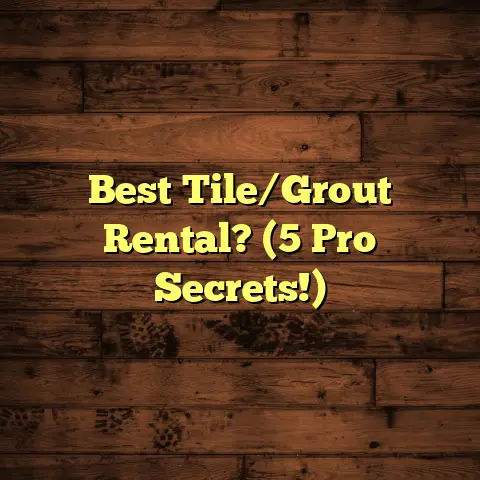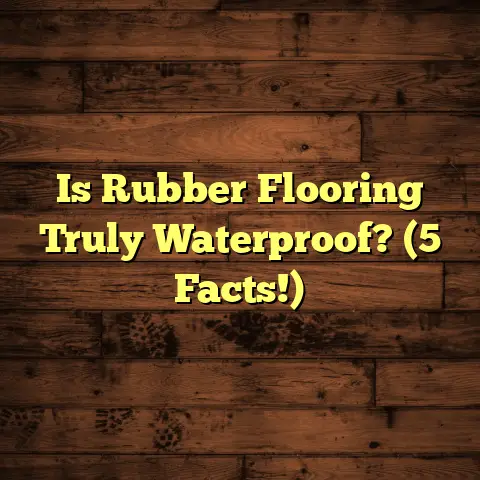Murphy Oil Soap On Hardwood? (1 BIG No-No!)
Hardwood floors. They’re beautiful, durable, and add a touch of elegance to any home.
I know, because I’ve installed and maintained them for over 20 years.
One of the things homeowners love most about hardwood is its relative ease of care.
A quick sweep and occasional mopping, and they look fantastic.
But with so many cleaning products on the market, it’s easy to get confused about what’s best for your floors.
You want to keep that luster, extend their lifespan, and avoid costly repairs. Right?
That’s why I’m here to talk about a common misconception: using Murphy Oil Soap on hardwood floors.
Spoiler alert: it’s a big no-no!
In this article, I’ll break down why this seemingly gentle cleaner can actually do more harm than good.
I’ll also share some safe and effective alternatives to keep your hardwood floors looking their best.
Section 1: Understanding Hardwood Floors
So, what exactly is hardwood flooring?
Simply put, it’s flooring made from a single piece of wood, typically from deciduous trees like oak, maple, or cherry.
These woods are known for their density and durability, making them ideal for high-traffic areas.
Think of it like this: softwood, from trees like pine, dents easily.
Hardwood?
Much tougher.
Here’s a quick rundown of some popular hardwood choices:
- Oak: Classic, durable, and readily available.
- Maple: Known for its smooth grain and light color.
- Hickory: Extremely durable and offers a rustic look.
- Cherry: Rich color that deepens over time.
- Walnut: Dark and luxurious, with a distinctive grain.
One of the biggest advantages of hardwood is its aesthetics.
The natural grain patterns and warm tones add character to any room.
Plus, it’s incredibly durable.
With proper care, a hardwood floor can last for decades, even generations!
And let’s be honest, hardwood is relatively easy to maintain compared to carpet.
Regular sweeping or vacuuming to remove dirt and debris is key.
But the how you clean it matters!
Choosing the right cleaning method is crucial to preserving the quality and extending the life of your beautiful hardwood.
Section 2: The Popularity of Murphy Oil Soap
Murphy Oil Soap has been around for over a century, first introduced in 1910.
It’s got that old-fashioned appeal, doesn’t it?
It’s marketed as a natural cleaner, made with plant-derived ingredients.
And let’s face it, that pleasant, nostalgic scent is a big draw for many homeowners.
I’ve heard countless homeowners say they use it because their mothers or grandmothers used it.
That familiarity breeds trust.
The marketing claims often imply it’s gentle and safe for all types of wood, including hardwood floors.
The label says it can be used on wood, so why wouldn’t you?
Many people believe it’s a safe, natural way to clean and restore the shine to their floors.
Here’s the catch: those claims don’t always tell the whole story, especially when it comes to hardwood floors with a polyurethane finish.
Section 3: The Composition of Murphy Oil Soap
Let’s take a closer look at what’s actually in Murphy Oil Soap.
While the exact formula is proprietary, the main ingredients typically include:
- Water: The base of the solution.
- Soap: Traditionally made from vegetable oils.
- Surfactants: Help to lift dirt and grime.
- Glycerin: A humectant that attracts moisture.
- Fragrance: For that signature scent.
The oil in Murphy Oil Soap is supposed to condition the wood.
Surfactants are there to help dissolve and lift dirt.
Sounds good, right?
The problem is that these ingredients can interact negatively with the finish on your hardwood floors.
Over time, the oils can build up, attracting more dirt and creating a dull, sticky residue.
The surfactants, while effective at cleaning, can also strip away the finish, leaving the wood vulnerable to damage.
That’s why understanding the composition is so important.
It helps you see how seemingly harmless ingredients can lead to long-term problems.
Section 4: The Risks of Using Murphy Oil Soap on Hardwood Floors
Okay, let’s get down to the nitty-gritty.
What are the actual risks of using Murphy Oil Soap on your hardwood floors?
I’ve seen the damage firsthand, and it’s not pretty.
Here are the most common problems I’ve encountered:
Residue Buildup: This is the biggest issue.
The oils in Murphy Oil Soap don’t evaporate.
Instead, they accumulate on the surface of the floor, attracting dirt and grime.
Over time, this creates a dull, hazy film that’s difficult to remove.
Your floors lose their shine and start to look grimy, no matter how often you clean them.Slippery Surfaces: That oily residue can also make your floors incredibly slippery.
This is a major safety hazard, especially for kids, elderly individuals, or anyone with mobility issues.
I’ve had clients slip and fall, resulting in injuries.
It’s simply not worth the risk.Damage to the Finish: The surfactants in Murphy Oil Soap can break down the polyurethane finish that protects your hardwood floors.
This finish is your floor’s defense against scratches, stains, and moisture damage.
Once it’s compromised, the wood becomes vulnerable.Water Damage: Murphy Oil Soap requires a lot of water to rinse properly.
Excessive water can seep into the seams between the boards, causing them to swell, warp, and even rot.
This is especially problematic in humid environments.
I remember one client, Mrs. Johnson, who had been using Murphy Oil Soap on her oak floors for years.
She loved the smell and thought it was keeping her floors clean.
But over time, her floors had become dull and sticky.
She tried everything to restore their shine, but nothing worked.
When I inspected her floors, I found a thick layer of residue that had penetrated the finish.
The only solution was to completely sand down and refinish the floors, a costly and time-consuming process.
Mrs. Johnson was devastated.
Her experience is a cautionary tale about the hidden dangers of using the wrong cleaning products.
Section 5: Alternative Cleaning Methods for Hardwood Floors
Alright, so Murphy Oil Soap is a no-go.
What should you use to clean your hardwood floors?
Don’t worry, there are plenty of safe and effective alternatives.
Let’s start with some natural solutions:
Vinegar and Water: A simple mixture of 1/4 cup of white vinegar per gallon of water can work wonders.
The vinegar helps to cut through grime without leaving a residue.
Just be sure to use a well-wrung mop to avoid over-wetting the floor.Baking Soda Paste: For stubborn stains, make a paste of baking soda and water.
Gently rub it onto the stain, let it sit for a few minutes, and then wipe it away with a damp cloth.DIY Dish Soap Solution: Mix a few drops of dish soap with warm water.
Use a microfiber mop and make sure to wring out as much water as possible.
If you prefer commercially available cleaners, look for products specifically designed for hardwood floors.
Here are some features to look for:
- pH-Neutral: This ensures that the cleaner won’t damage the finish.
- Residue-Free: Avoid cleaners that leave behind a film or buildup.
- Water-Based: Water-based cleaners are generally safer for hardwood than oil-based ones.
Some popular brands I recommend include:
- Bona Hardwood Floor Cleaner: A widely trusted and effective option.
- Method Squirt + Mop Hardwood Floor Cleaner: Plant-based and gentle.
- Armstrong Hardwood & Laminate Floor Cleaner: Specifically formulated for Armstrong floors, but safe for most hardwood finishes.
No matter what cleaner you choose, always test it in an inconspicuous area first to make sure it doesn’t damage the finish.
Section 6: Proper Maintenance Practices for Hardwood Floors
Cleaning is just one part of maintaining your hardwood floors.
Here are some other essential practices to keep them looking their best:
Routine Sweeping or Vacuuming: This is the most important thing you can do to prevent scratches and dirt buildup.
Aim to sweep or vacuum at least once a week, or more often in high-traffic areas.
Use a soft-bristled broom or a vacuum with a hardwood floor attachment.Use Area Rugs: Place area rugs in high-traffic areas, such as entryways, hallways, and in front of sinks.
Rugs help to protect the floors from scratches, dirt, and moisture.Protective Measures Against Scratches and Scuffs: Use felt pads under furniture legs to prevent scratches.
Avoid wearing shoes with high heels or cleats on hardwood floors.
Trim your pets’ nails regularly.Control Humidity Levels: Hardwood floors are sensitive to changes in humidity.
Excessive humidity can cause the wood to swell, while low humidity can cause it to shrink and crack.
Maintain a consistent humidity level in your home, ideally between 30% and 50%.Professional Cleaning and Refinishing: Every few years, consider hiring a professional to deep clean and refinish your hardwood floors.
This will remove any accumulated dirt and grime, restore the finish, and extend the life of your floors.
I often recommend professional cleaning every 2-3 years, depending on the amount of traffic the floors receive.
Refinishing may be necessary every 7-10 years, or when the finish starts to show signs of wear and tear.
By following these maintenance practices, you can keep your hardwood floors looking beautiful and extend their lifespan for years to come.
Conclusion
So, there you have it.
Murphy Oil Soap might seem like a gentle, natural cleaner, but it can actually do more harm than good to your hardwood floors.
The residue buildup, slippery surfaces, and damage to the finish are simply not worth the risk.
Instead, opt for safe and effective alternatives like vinegar and water or commercially available hardwood floor cleaners.
And remember, proper maintenance practices, such as routine sweeping, area rugs, and professional cleaning, are essential for preserving the beauty and functionality of your hardwood floors.
As a flooring contractor, I’ve seen the devastating effects of using the wrong cleaning products.
I want you to be an informed consumer who prioritizes the health of your hardwood investment.
By choosing the right cleaning products and techniques, you can keep your hardwood floors looking their best for years to come.
Don’t let a seemingly harmless cleaner ruin your beautiful hardwood floors.
Choose wisely, and enjoy the lasting beauty of your investment.





